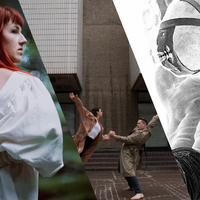Thu 8 Feb: BlacBrik, Louiseanne Pui Chi Wong and Madi Plunkett

News Story
BlacBrik Episodes of Blue
Louiseanne Pui Chi WongI Am. Am I (me, my fridge and I)
Madi Plunkett As they danced their bodies shed
A fridge-freezer.
A perplexing way to start a show, but as krump and parkour dancer Lousieanne Wong wades through, and subsequently throws out its contents in frustration to an increasingly agitated inner-monologue, their choice of prop seems obvious. A fridge is an insight into one’s cultural heritage - each person’s fridge contents are unique to them (metaphorically and literally). All Louiseanne wants is not to be judged for the contents of their fridge (metaphorically). The work has a fitting climax as they expel their anger atop the appliance, but further development of I am. Am I’s subtler ideas will help bring more immediate clarity to its message.
Equally unclear was BlacBriks’Episodes of Blue. Two separate duets, the first reminisces on the good old days, as two stools, funky music and fluid leaps and turns joyfully evoke being in a prohibition-era bar. After a short break, the men and the jazz return, putting on white trainers to explore their Black experience. The shoes glow against the moody background as tension builds and one man is fought to the floor. Unfortunately, the news clips were difficult to hear leaving the piece’s full message unclear. Despite this, as the dancers mournfully remove their shoes, it’s undeniable that they have the starting point for a great show.
Conversely, As they danced, their body shed is a clearer exploration of the trans experience. Contorting and twitching movements make our protagonist’s discomfort in their body evident immediately. There was some interesting moments in this, from being devoured by their fellow four dancers to a touching duet with the only masculine presenting dancer, who caressed his chin as if to say ‘I’ve got you’, his confidence growing. Unfortunately, the roles of some of the other dancers remain unclear. As the group comes together in a flurry of clothing and chiffon, the jubilant, freeing message is obvious - embrace yourself!
Beatrice Thomas
Here were three works defined by very different qualities of movement, each somehow in search of an identity and possessing memorable moments but only the middle piece left me wanting more.
In a work labelled as “in progress” Louiseanne Pui Chi Wong partnered a tall fridge-freezer onto which they leapt parkour-style, performing some aggressive krump precariously while perched on top; and into which they curled, folding their body to fit in the upper compartment, like stowing away a corpse. Wong had earlier deconstructed the fridge’s interior, scattering shelves and cartons while incongruously discovering a passport alongside the oat milk - a clue to the work’s questioning of humans being labelled like products. Bursts of fluid hip hop and aggressive krumping showed strong movement skills within this domestic frame.
Blackbrik’s work exhibited the slickest, strongest dance quality that I’ve seen in Resolution ‘24. Two numbers separated by a blackout showcased the silky-smooth style and inherent musicality of Nahum McLean and Darius Drooh, performing exceptionally as individuals and even more so when duetting in pinpoint synchronicity. Kudos to Joshie Harriette’s lighting design which seamlessly faded the performers out of sight while still in full view.
The final work, by Madi Plunkett – billed as an abstract exploration of trans and queerness in the body - was performed by an attractive quintet, albeit dominated by two extraordinary solos by Zac Priestley. His shape-shifting movement ranged from dislocated form to elongated elegance, at one moment crouching like Quasimodo on the steps of Notre-Dame and the next like a graceful heron taking flight. These solos were followed by a sensitive male duet with Mark Halton. Costumes seemed to have been pulled from the dressing-up box in the local church hall, an image emphasised by discarded clothing around the stage. Peeling off Priestley’ s pullover led to the group collapsing into an orgiastic huddle of clothes swapping as the light faded.
Graham Watts


